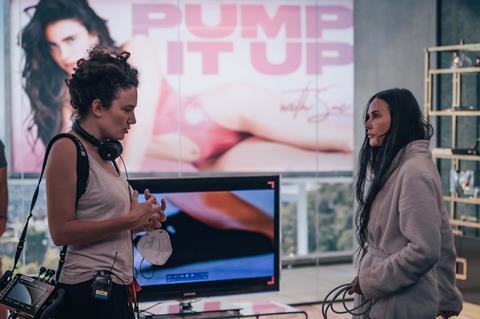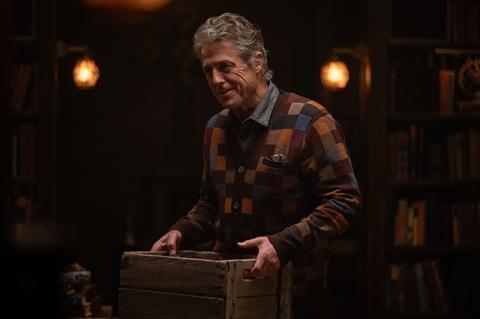This year’s balanced set of Bafta nominations suggest the awards race remains wide open across multiple categories. Screen talks to four UK awards campaigners about their verdicts — and predictions.

A year ago, nominations for the Bafta Film Awards were met with more than a few raised eyebrows, thanks to juried performance categories where decisions seemed way out of kilter with voter sentiment. And many questioned the point of having a jury determine the director nominees if the outcome is a list of five men (or male teams) and just one woman — as was the case both last year and the year before.
In 2024, Bafta announced its latest reforms of the voting processes for the film awards, rowing back on some of the heaviest jury interventions that were introduced in the wake of the #Baftasowhite debacle of 2020. For the 2025 awards, there would no longer be any jury intervention for director; instead, director chapter votes would determine a gender-balanced longlist of 10, and then the chapter would have a free vote to yield the six nominees. In performance categories, there is still a jury making a small intervention at the longlisting stage, but the juries to determine nominations have been abolished — instead, acting chapter members have a free vote.
Every year since Bafta introduced its changes for the 2021 awards, Screen International has spoken to a number of UK-based awards campaigners to gauge their reaction to the nominations — and last year those responses were decidedly mixed. One campaigner labelled some of the jury decisions across the four acting categories “bewildering”.
This year, the four awards campaigners (two women and two men) who speak to Screen each year under the condition of anonymity, are expressing broad acceptance and even enthusiasm for the outcome of the nominations.
Competing this year in the best film category are Anora, The Brutalist, A Complete Unknown, Conclave and Emilia Pérez. Conclave leads with 12 nominations — one down on Oppenheimer’s 13 last year — and there are 10 titles in total with nods in five or more categories, including all five of the best-film nominees plus Wicked, Dune: Part Two, Kneecap, Nosferatu and The Substance.
“I am broadly positive,” offers one campaigner, summing up the consensus. “It’s a pretty good, credible list of nominations, and if you look at the titles that are up for best film, they are good films.”
“I think the overall reaction is that there’s still no front runner, and that it’s spread around,” suggests another campaigner, approvingly. And a third says, “I’m sorry when Wicked or The Substance, which had obviously been hoping for a best film slot, doesn’t get it — but they’re well-represented across the categories, as are a wide range of titles. It’s a good mix.”
“The night before the nominations came out, I still was not sure what films were going to make the final five for best film,” offers the fourth campaigner. “That’s what has made this year so exciting. And every single person — whether that’s a campaigner or a member or a studio executive — has a different film that they think is going to win. There isn’t a general coalescing around one title like there was last year with Oppenheimer.”
Death of the juries

While one of the campaigners who spoke to Screen has more time for the jury system (“If you look at the nominations, there’s still an argument that Bafta could need interventions, and it’s not as diverse as the country as a whole is”), the other three are unambiguously relieved to see the end of juries to determine acting and directing nominations.
“Bafta brought in the jury system for a very good reason,” says one campaigner. “Once you bring something in, it gives you that security blanket. It may have taken a bit of a mind shift for them to essentially let the kids go free again, and put the trust back in the membership.”
And unlike the 2020 awards — the last time Bafta members determined the performance nominees — there is ethnic diversity across the acting categories, with Cynthia Erivo, Marianne Jean-Baptiste, Colman Domingo, Clarence Maclin and Zoe Saldana (of Dominican and partial Puerto Rican ancestry) nominated alongside Selena Gomez (who has Mexican ancestry).
The campaigners agree that, while you can always point to perceived omissions — which this year might include the likes of Queer’s Daniel Craig and Gladiator II’s Denzel Washington — any such omissions are easier to accept when they are the result of performance chapter votes rather than a quirk of jury taste. “One hundred percent,” comments one of the quartet.
As for Craig, says another: “Queer didn’t make any longlist other than for lead actor, so I just don’t think people like the film enough.” For Washington, who prior to Gladiator II had 10 Oscar nominations and two wins but zero Bafta nominations, the shutout continues. “Denzel — if there was ever a time to give him a nomination, this was surely it.”
With no jury for best director this year, the votes of the chapter produced a gender-lopsided bunch of nominees, with all five men on the longlist going on to be nominated: Jacques Audiard (Emilia Pérez), Sean Baker (Anora), Edward Berger (Conclave), Brady Corbet (The Brutalist) and Denis Villeneuve (Dune: Part Two). Of the five women longlisted for director, Coralie Fargeat (The Substance) emerges as the sole nominee. This category had the same gender balance of nominees (five/one) in 2024 and 2023, where the nominees were a mix of members’ top votes and jury picks from a gender-balanced longlist.
“It’s a male-dominated director category again, which is a shame,” says one campaigner. “There’s been some excellent work by female directors that would be equally at home here. The systemic issues in our industry are going to take a while to see a complete transformation. And I do think that the longlist, ensuring there is gender parity, is a positive thing for director.”
The elimination of juries in key categories gives campaigners more agency, but the flipside for them is they can no longer use the jury system as an excuse when nominations are not achieved.
“If something didn’t go your way, you could blame it on the jury,” explains one campaigner. “However, I don’t think the juries provided a fair representation of what the membership wanted to be in these categories. As tough as it is to explain to your client when a nomination doesn’t land, that’s part of the job.”
“I prefer not having juries, and I don’t enjoy having them to blame,” says another campaigner. “I’d take it being a broader chapter vote over a jury vote any day of the week, even if that does put me in hotter water.”
One consequence of the elimination of juries is the relative lack of surprises in the nominations — and of course the publication of longlists after round-one voting has already revealed a fair picture of voter sentiment. In recent years, the biggest shocks (such as the omission last year of All Of Us Strangers’ Andrew Scott in leading actor) related to quirks of jury taste. Instead, most of this year’s surprises came earlier, at the longlist stage, which saw the total elimination of many films considered to be in contention, including Pablo Larrain’s Maria, Pedro Almodovar’s The Room Next Door, Tim Fehlbaum’s September 5, Jason Reitman’s Saturday Night and Malcolm Washington’s The Piano Lesson.
Longlist inclusion does not guarantee nomination, and some longlisted titles — such as Babygirl — fell by the wayside at the nominations stage. Conversely, the second round of voting brought validation to films that turned every one of their longlist inclusions into a nomination: A Real Pain (converting both its longlists into Bafta nods), Sing Sing, Wallace & Gromit: Vengeance Most Fowl and The Wild Robot (all hitting three for three) and Nosferatu (achieving five for five).
Family matters

Bafta has not made a strong start with its introduction of a children’s and family film category to the film awards — at least not according to our campaigners. This new category came about after Bafta decided to cancel its loss-making Children’s Awards, folding various prizes into other ceremonies. Nominated this year are four animated titles: Flow, Kensuke’s Kingdom, Wallace & Gromit: Vengeance Most Fowl and The Wild Robot. All of those titles except Kensuke’s Kingdom are likewise nominated for animated film (alongside Inside Out 2).
The process is fully juried for children’s and family film, and the jury chose to overlook all the live-action films and documentaries submitted, including Paddington In Peru.
“It’s pointless. It’s almost a rinse repeat of the animation category, except that the members don’t get a chance to vote on it,” is the scathing verdict of one campaigner. “Let’s see how long it lasts.”
“To be fair, a lot of the fun family fare has been animated this year,” says another. “But poor Paddington — this was surely the perfect opportunity for him to have been shown some love.”
The children’s and family film jury was hampered by a lack of submissions to the category from distributors — no Wicked or Mufasa: The Lion King, both PG-rated, for example. And to varying degrees, the campaigners are forgiving of an award that is still in its infancy at the Bafta Film Awards, and they also have some constructive suggestions.
“Wicked was probably never going to submit to a category called ‘children’s and family film’,” suggests one. “But if they took ‘children’s’ out of the name, you might get a broader set of submissions, including inspirational dramas such as Unstoppable and The Fire Inside, and documentaries such as The Remarkable Life Of Ibelin and Daughters.”
“I think there’s no objective way of deciding what film can and can’t enter, and that makes me feel a bit uncomfortable,” comments one campaigner. Another says, “I think people are just cautious. Does this mean it’s a consolation prize if you’re not getting animation or outstanding British film? This is something that Bafta needs to work on in the off-season, going out to distributors and campaigners to talk about how this could have been a cool opportunity for a film to get a spotlight.”
Predictive text
In the performance categories, our campaigners broadly think the races remain wide open for leading actor and actress, and less so in supporting.
“The leading actress category was always going to be a bit of a bloodbath, because it’s a really strong year,” offers one campaigner. Another says, “Wouldn’t it be amazing if Karla Sofia Gascon won? That would be so wonderful, but I think she’ll be hard pushed in that company.”
The Emilia Pérez star is the first openly transgender actress to receive a Bafta film nomination. This same campaigner suggests The Substance’s Demi Moore is a more likely win — and a way for fans of the film to register their support. “Everybody loves a comeback, and a win for Demi is a win for the film.” (Wicked’s Erivo, Hard Truths’ Jean-Baptiste, Anora’s Mikey Madison and The Outrun’s Saoirse Ronan are also nominated.)
Conclave’s Ralph Fiennes and The Brutalist’s Adrien Brody are both considered strong in leading actor, while Timothée Chalamet is making a late surge in UK box-office smash A Complete Unknown. And, as one campaigner points out, Bafta voters gave the prize to Austin Butler two years ago for Elvis, despite The Whale’s Brendan Fraser winning at other key awards including the Oscars and Screen Actors Guild. Will Bafta again choose the young man playing a music icon?

For entertainment value, this campaigner is pulling in an altogether different direction. “I would love best actor to go to Hugh Grant for Heretic. His acceptance speech would be the most entertaining moment of the night.” (Sing Sing’s Colman Domingo and The Apprentice’s Sebastian Stan are also nominated.)
“It’s definitely a hard year to call,” says another campaigner. “And a hard year to call is good. It means there are lots of good performances out there.”
In supporting actor and actress, both A Real Pain’s Kieran Culkin and Emilia Pérez’s Zoe Saldana continue to be mentioned as front-runners — and, as with Moore and The Substance, this could be where fans of these titles get to register their support. Other strong competitors in the two supporting acting categories include, respectively, Anora’s Yura Borisov and Wicked’s Ariana Grande.
Although the campaigners reckon this year’s awards season remains wide open, when push comes to shove, a couple of them are willing to nail some colours to the mast specifically for the Baftas. “If I were a betting man, I would bet on Conclave,” suggests one. “It’s an easy-to-like film, and I don’t mean that as a diss.”
“It’s a film that I just think is so member-friendly,” concurs another. “I don’t replicate that feeling for any other awards body other than Bafta — I don’t think it’s going to wipe the board at the Oscars, for example. But the Baftas, it’s not necessarily where I’d put my vote, but it’s where I’d put my money for best film.”

























No comments yet